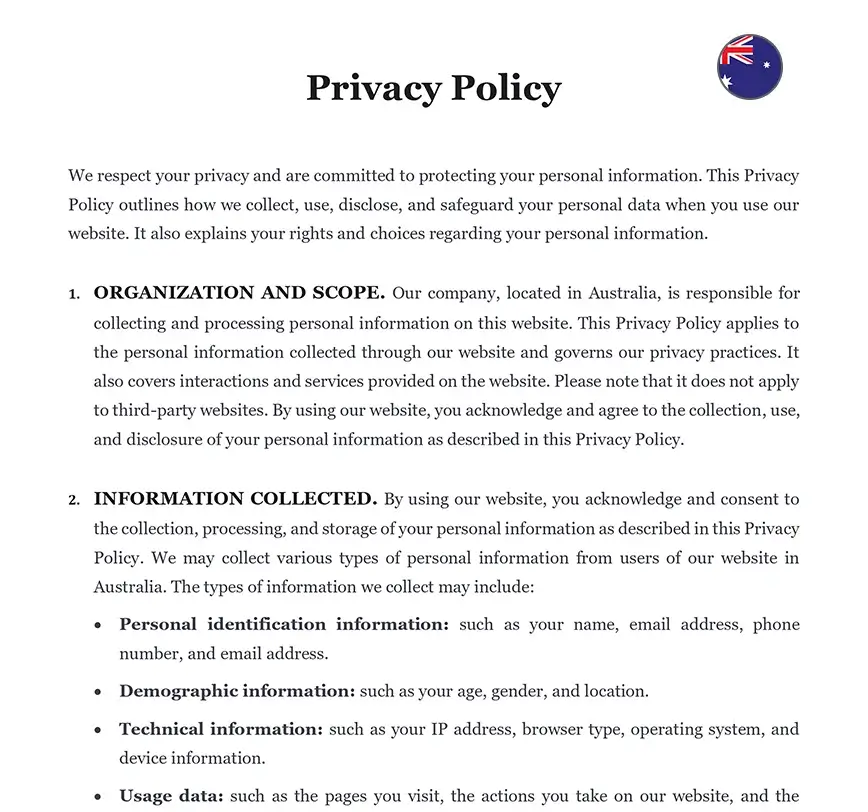Ready to use legal template
Drafted by experienced lawyers
Compliant with Australian law
Ready to use legal template
Drafted by lawyers
Compliant with Australian law
Home › Intellectual property › Privacy Policy
Learn more about Website Privacy Policy in Australia
A Privacy Policy is a legal document that outlines how a website or organization collects, uses, manages, and protects the personal information of users or customers. In Australia, Privacy Policies are governed by various laws and regulations, such as the Privacy Act 1988 (Cth), which sets out the requirements for handling personal information in the private sector. A Privacy Policy typically includes information about the types of personal data collected, the purposes for which it is used, how it is stored and protected, and individuals’ rights regarding their personal information.
Table of contents
-
What is a Privacy Policy in Australia?
-
Why use a Privacy Policy in Australia?
-
What should it include?
-
How does it comply with privacy regulations in Australia?
-
What if I don’t have a Privacy Policy?
-
How does it address personal data collection in Australia?
-
How does a privacy policy address cookie consent in Australia?
What is a Privacy Policy in Australia?
In Australia, a Privacy Policy is a legal document that outlines how an organization collects, uses, discloses, and manages personal information obtained from individuals. It is a fundamental component of privacy law compliance and plays a crucial role in establishing transparency and trust between organizations and individuals.
Why use a Privacy Policy in Australia?
Privacy Policies are essential for businesses and organizations in Australia for several reasons. Firstly, they ensure compliance with Australian privacy laws, such as the Privacy Act 1988 (Cth) and the Australian Privacy Principles (APPs). These laws mandate that organizations handling personal information must take reasonable steps to protect it and inform individuals about their privacy practices. Failure to comply with these laws can result in significant penalties and reputational damage.
Additionally, Privacy Policies demonstrate a commitment to transparency and respect for individuals’ privacy rights. By clearly articulating how personal information is collected, used, and protected, organizations build trust with customers, employees, and other stakeholders. Trust is essential in today’s digital age, where data breaches and privacy concerns are prevalent, and consumers are increasingly wary of sharing their personal information online.
Furthermore, Privacy Policies serve as risk management tools, helping organizations mitigate the risk of privacy breaches, data misuse, and regulatory penalties. By establishing clear guidelines for data handling and privacy safeguards, organizations can better protect sensitive information and minimize the likelihood of legal disputes or enforcement actions.
What should it include?
A comprehensive Privacy Policy in Australia should include the following key components:
1. Introduction:
An overview of the organization’s commitment to privacy and the purpose of the Privacy Policy.
2. Types of Information Collected:
Details about the types of personal information collected, such as names, contact details, and payment information.
3. Purpose of Collection:
The reasons for collecting personal information and how it will be used, such as for providing services, processing transactions, or marketing purposes.
4. Disclosure of Information:
Circumstances under which personal information may be disclosed to third parties, such as service providers, business partners, or government authorities.
5. Data Security Measures:
Information about the security measures in place to protect personal information from unauthorized access, use, or disclosure.
6. User Rights:
Explanation of individuals’ rights regarding their personal information, including the right to access, correct, or delete data.
7. Contact Information:
Contact details for inquiries, complaints, or requests related to privacy matters.
How does it comply with privacy regulations in Australia?
A Privacy Policy ensures compliance with Australian privacy regulations by addressing the requirements set forth in laws such as the Privacy Act and the APPs. This includes obtaining individuals’ consent for the collection, use, and disclosure of their personal information, limiting the collection and use of personal information to specific, lawful purposes, implementing appropriate security measures to protect personal information from unauthorized access, use, or disclosure, and providing clear and accessible information about privacy practices, including how personal information is handled and individuals’ rights.
What if I don’t have a Privacy Policy?
Failure to have a Privacy Policy in Australia can have serious consequences, including legal non-compliance, loss of trust, and data breach risks. Organizations that fail to comply with privacy laws may face regulatory investigations, penalties, or enforcement actions by authorities such as the Office of the Australian Information Commissioner (OAIC). Additionally, lack of transparency regarding privacy practices can erode trust among customers, employees, and stakeholders, leading to reputational damage and loss of business. Without clear privacy policies and safeguards, organizations are also at greater risk of data breaches, identity theft, and other security incidents.
How does it address personal data collection in Australia?
A Privacy Policy addresses personal data collection in Australia by clearly specifying the types of personal information collected, the purposes for which it is collected, the legal basis for collecting it, and individuals’ rights regarding their personal information. By providing this information, organizations ensure transparency and compliance with privacy regulations, empowering individuals to make informed decisions about their data.
How does a privacy policy address cookie consent in Australia?
In Australia, a Privacy Policy typically includes information about the use of cookies and other tracking technologies. This may include notification of the use of cookies on the website or online platform, explanation of the purposes for which cookies are used, options for users to manage cookie settings or provide consent to the use of cookies, and information about third-party cookies and tracking technologies used by the organization or its partners. By including this information in the Privacy Policy, organizations ensure transparency and compliance with privacy regulations regarding cookie consent in Australia.
SPECIAL OFFER
eCommerce
5 Document Package
Essential website/app policies for online business in Australia
Privacy Policy
Template (.docx)
Easy and quick to customize
310 client reviews (4.8/5) ⭐⭐⭐⭐⭐
Share information
Why Themis Partner ?
Make documents for
hundreds of purposes
Hundreds of documents
Instant access to our entire library of documents for Australia.
24/7 legal support
Free legal advice from our network of qualified lawyers.
Easily customized
Editable Word documents, unlimited revisions and copies.
Legal and Reliable
Documents written by lawyers that you can use with confidence.




